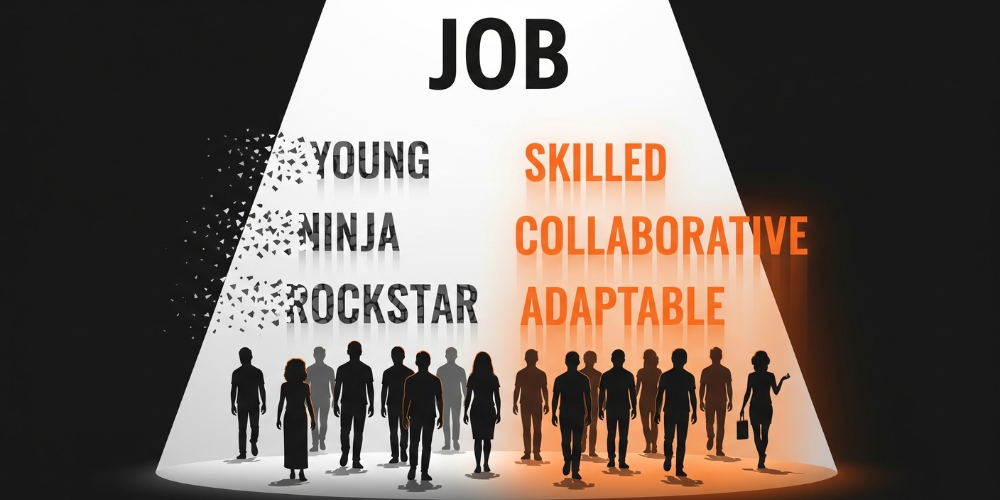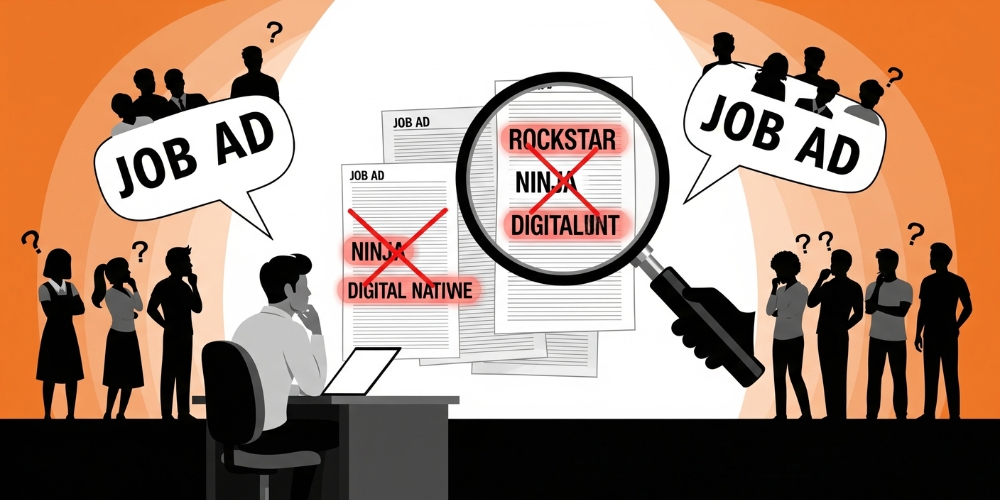
TL;DR
- Avoid outdated or discriminatory phrases in job descriptions
- Replace age-coded terms with neutral descriptors
- Skip buzzwords and use clear job titles and gender-neutral language
- Don’t require physical abilities or first-language requirements unless essential
- Use balanced, inclusive language to avoid gender-coded wording
- Focus on inclusive and neutral language that comply with anti-discrimination laws
Writing a job post isn’t just about listing responsibilities—it’s about making the right people feel like they belong. But here’s the problem: most job listings still include subtle, outdated words to avoid in job descriptions—and those words quietly push great candidates away.
Sometimes, cutting a few problematic phrases with job descriptions can make a huge difference. This blog will break down the politically incorrect words that quietly turn candidates away, the red-flag phrases you should replace ASAP, and more. Whether you’re new to writing a job description or cleaning up one that’s been reused too many times, this is how you get it right—and attract the people you want on your team.
Spot the Red Flag Quiz
Which of these lines could push candidates away Select all that apply then press Check answer.
Why Wording Matters in Job Descriptions

The words you choose in a job description do more than fill space. They set the tone for who applies, who feels welcome, and who quietly scrolls past. A line like “must be young and energetic” might look harmless, but it subtly tells some candidates that they don’t belong. Others might see words like “rockstar” or “guru” and wonder if the company values hype over clarity.
That’s why wording isn’t just about style. It’s about impact. Every phrase you include is either an invitation or a closed door. Clear and inclusive language draws in the right people, helps avoid hidden bias, and signals that your workplace is a space where talent is valued over labels.
Think of your job description as the very first handshake with a candidate. If that handshake feels awkward or exclusive, many will never take the next step. But if it feels clear, fair, and open, you’ve already started building trust before the interview even begins.
Rewrite This Phrase
See a common red flag and reveal a clean rewrite. Cycle through examples.
Phrases and Words to Avoid in Job Descriptions

It doesn’t matter whether you’re a genius at writing job descriptions or just getting started; odds are, you’ve used a few phrases that felt fine back then but don’t fly today. It’s not always on purpose. But it still makes an impact. And it’s worth fixing. Knowing job description words to avoid isn’t about nitpicking—it’s about making sure your post speaks to everyone, not just a narrow group.
So if you want to write listings that are inclusive, clear, and legally safe, start by ditching words that are not politically correct or outdated language. Here are some of the most common red-flag words—and what to say instead.
1. “Digital Native”
This phrase is often used to imply someone who grew up with technology. However, it implies a preference for younger candidates, potentially opening the door to age discrimination. According to the EEOC, even subtle cues like this can be considered violations of the Age Discrimination in Employment Act (source). A better option? Use “tech-savvy” or “comfortable with digital tools” — these describe the skill without hinting at someone’s age.
2. “Rockstar,” “Ninja,” “Wizard,” or “Guru”
These buzzwords may seem playful, but they often confuse more than they clarify. They’re also overwhelmingly male-coded. Stick with standard titles like “Marketing Specialist” or “Software Engineer” to make your roles clearer and more inclusive.
3. “Able-bodied,” “Must Lift 50 lbs,” “Physically Strong”
These politically incorrect words can exclude people with disabilities — even if that’s not your intent. Unless the physical requirement is essential to the job, including it can violate the Americans with Disabilities Act (ADA). The law states that employers must focus on essential job functions, not arbitrary physical standards. Instead of “must lift,” consider phrasing like: “Ability to lift up to 25 pounds, if job-relevant.”
4. “English Must Be Your First Language”
This one’s a big no. Requiring someone’s first language to be English is not only unnecessary for most roles, it can also be discriminatory. The U.S. Department of Labor clearly states that such requirements are only lawful when language skills are a business necessity. If language proficiency is important, say: “Fluency in English required for written and verbal communication.”
5. Gender-Coded Language
Words matter—especially when they lean one way. Terms like “competitive,” “driven,” or “rockstar” tend to attract more male candidates. On the flip side, words like “supportive” or “nurturing” often pull in more women. The problem? It skews your applicant pool before you even start. Research from STEM Women found that masculine-coded job ads actively discourage women from applying.
The fix? Use balanced language that works for everyone. Try words like “collaborative,” “strategic,” or “adaptable.” They’re inclusive—and still powerful.
How to Create Inclusive Job Descriptions

Don’t take writing inclusive job descriptions just as a DEI initiative — it’s a business advantage. Inclusive language invites more applicants, improves the quality of your talent pool, and helps you stay compliant with anti-discrimination laws. So, how can you make your descriptions more inclusive? Start here:
Use Clear, Neutral Language
Avoid jargon or metaphorical phrases that may seem exciting but confuse or discourage applicants. Terms like “rockstar developer,” “digital ninja,” or “sales wizard” don’t clarify expectations — they create ambiguity. Instead, use action-based language like “develops innovative solutions,” “drives sales growth,” or “collaborates across teams.”
And steer clear of phrases with job ads like “young and energetic” or “clean-cut professional.” These are often politically incorrect words that suggest age, appearance, or cultural bias, even if unintentionally.
Prioritize What’s Truly Essential
It’s easy to list out a laundry list of “nice-to-haves,” but that can overwhelm potential applicants. Focus only on essential job duties and responsibilities, and make it clear which ones are required vs. preferred. This is especially helpful in reducing the “confidence gap,” particularly for women, who tend to apply only when they meet 100% of the criteria, compared to men, who apply if they meet about 60% as stated by HBR.
Be Specific About Accessibility
Add a brief accommodation statement to show you’re inclusive of people with disabilities. For example: “We’re committed to accessibility. If you require accommodations during the hiring process, let us know.” Also, review your job description physical requirements. Don’t include requirements like “must lift 50 lbs” unless it’s absolutely essential to the role.
Watch for Words That Are Politically Incorrect
Phrases like “must be native English speaker” or “manpower” may seem harmless but can signal exclusion. The U.S. Department of Labor emphasizes that fluency requirements must be based on actual business needs, not assumptions (source).
Instead of saying “English must be your first language,” say “strong written and verbal communication skills in English are required.” It’s accurate and inclusive.
How to Create Inclusive Job Descriptions
Use the checklist to review key points. Then build a clean sentence from the dropdowns.
Inclusive JD Checklist
Build a clean sentence
Impact of Exclusionary Language on Potential Employees

Let’s be clear: exclusionary language doesn’t just limit your talent pool — it creates long-term brand and cultural risks. Candidates remember how a company made them feel during the application process, and even a single problematic phrase can shape that perception.
You Lose Qualified Candidates
Using biased or unclear language can drastically reduce the number of applications. Masculine-coded job descriptions decreased the number of women applicants regardless of their qualifications.
And it’s not just gender — words to avoid in job descriptions also include those that alienate based on age, physical ability, or race. Even subtle cues like “recent graduate” or “energetic team player” may discourage experienced or disabled professionals from applying.
It Damages Your Employer Brand
Today’s job seekers are highly attuned to company values, and they share their experiences online. A biased job ad can quickly become a screenshot on social media or a cautionary tale on review sites like Glassdoor. Over time, this weakens your employer brand and makes it harder to recruit top talent.
It Opens You Up to Legal Risk
Biased language isn’t just bad for your brand; it can land you in legal trouble. If your job post includes politically incorrect words or phrasing that even suggests discrimination, you could be violating EEOC guidelines, the ADA, or Title VII of the Civil Rights Act. How to fix it? Use inclusive, specific job description words that leave no room for misinterpretation.
Impact of Exclusionary Language on Potential Employees
Job Ad
We want a young and energetic rockstar. Must be a native English speaker. Must lift 50 lbs regularly. Recent graduates preferred.
Job Ad
Looking for a collaborative professional with strong English communication skills. Role may include moving packaged materials up to 25 pounds if job relevant. All experience levels welcome to apply.
Conclusion
Here’s the bottom line: words to avoid in job descriptions aren’t just about political correctness, they’re about performance. The way you write determines who applies, who feels seen, and who gets left out. So the next time you’re writing a job description, stop and ask: Does this speak to everyone or just a select few? Inclusive language isn’t fluff. It’s strategy. It brings in better candidates, boosts your brand, and helps build teams that actually reflect the world we work in. And it all starts with the words you choose.




